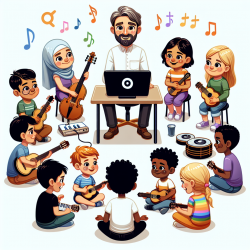As a practitioner dedicated to creating positive outcomes for children, you may find the research on music-based interventions to reduce aggressive behavior in children and adolescents both fascinating and practical. A recent meta-analysis by Ye, Huang, Zhou, and Tang (2021) provides compelling evidence that these interventions, particularly music therapy, can significantly decrease aggressive behavior and improve self-control in young individuals.
Here’s a breakdown of the key findings and how you can implement these insights in your practice:
Key Findings from the Meta-Analysis
- Significant Reduction in Aggressive Behavior: The study found that music-based interventions led to a significant decrease in aggressive behavior, with a standardized mean difference (SMD) of -0.99. Music therapy, in particular, showed a more substantial effect (SMD = -1.79) compared to music medicine.
- Improvement in Self-Control: Children and adolescents in the music-based intervention groups also exhibited significant improvements in self-control (SMD = 0.56).
- Frequency and Duration Matter: The interventions were more effective when conducted at least twice a week and for durations of up to 12 weeks.
- Age and Initial Aggression Levels: Older children (mean age >10 years) and those with pre-existing aggressive behaviors benefited the most from these interventions.
Implementing Music-Based Interventions in Your Practice
Based on these findings, here are some actionable steps you can take to integrate music-based interventions into your therapeutic practice:
- Opt for Music Therapy Over Music Medicine: Ensure that the interventions are conducted by credentialed music therapists who can establish a therapeutic relationship with the children. This approach has shown superior effectiveness.
- Frequency and Consistency: Schedule music therapy sessions at least twice a week. Consistency is key to achieving significant behavioral improvements.
- Focus on Older Children and Those with Aggressive Behaviors: Tailor your interventions to older children and those who exhibit aggressive behaviors prior to the intervention. This demographic has shown the most significant improvements.
- Monitor and Evaluate: Use standardized tools like the Child Behavior Checklist (CBCL) and Teacher Rating of Aggression (TRA) to assess changes in aggressive behavior and self-control. Involve teachers in the evaluation process, as their observations tend to reflect the most significant changes.
Encouraging Further Research
While the findings are promising, there is always room for further research. Consider conducting your own studies or collaborating with researchers to explore additional variables such as the impact of different types of music or the long-term effects of these interventions.
To read the original research paper, please follow this link: Music-based intervention to reduce aggressive behavior in children and adolescents.
By incorporating these evidence-based strategies into your practice, you can make a meaningful difference in the lives of children struggling with aggressive behaviors. Your commitment to data-driven decisions and passion for positive outcomes will undoubtedly lead to more effective interventions and happier, healthier children.










